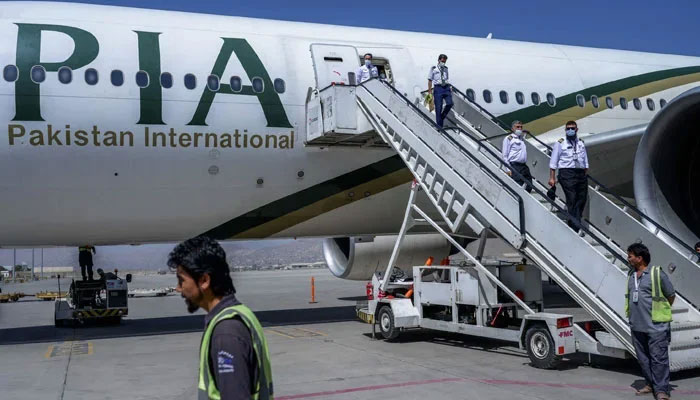EASA authorisation a ‘lifeline’ for struggling airline
Macroeconomist Ammar Habib said announcement is “good news” for government’s privatisation plans
KARACHI: The European Union’s announcement that it has lifted the ban on Pakistan International Airlines (PIA), allowing it to resume its direct flights to Europe, is likely to improve the country’s national flag carrier’s financial outlook, say experts.
In his conversation with The News, aviation journalist Tahir Imran Mian said that the restoration of third-country operator (TCO) authorisation for PIA by the European Union Aviation Safety Agency (EASA) is “a crucial milestone” for the country’s struggling aviation industry.
This long-awaited decision, according to Mian, provides a significant breather to an industry that has been reeling under regulatory challenges and the reputational fallout caused by a former aviation minister’s controversial statements during the Imran Khan government.
What does this announcement mean for PIA’s privatisation plans, especially when the national carrier has already lost its charm for most buyers? Back in October, only a single consortium had submitted prequalification documents for the privatisation of PIA, raising concerns over the state-owned enterprise’s lost lustre.
Macroeconomist Ammar Habib Khan said that the recent announcement is “good news” for the government’s privatisation plans. With access to European markets restored, PIA can now reclaim routes that previously generated substantial revenue, a win-win for the potential buyer.
He said that the focus should be how “the government will structure the deal now and check what value it can add from the European routes” to make the acquisition worthwhile for the buyer.
The reinstatement of the TCO allows Pakistani carriers, particularly PIA and Airblue, to resume non-stop flights to destinations across the European Union and Scandinavia after a four-year hiatus.
The airlines got itself trapped in financial and administrative troubles after a crash in May 2020 that killed 97 people. The ban that was imposed in July 2020 was initially supposed to be six-month-long, but the relief only came after tumultuous four years.
Per Mian’s estimates, the EASA ban cost at least $1 billion to the national carrier, directly and indirectly, “This figure reflects not only direct revenue losses from suspended flights but also indirect costs, such as underutilised aircraft incurring lease payments and ongoing operational expenses like staff salaries,” he said.
Mian added “[the resumption of services in Europe] will definitely improve PIA’s worth as a whole and make its ‘books’ look much better.”
In her post on X (formerly Twitter), EU Ambassador to Pakistan Riina Kionka said: “In 2020…EASA took the technical decision to suspend [PIA]. From 2020 to 2024, [Pakistan’s] Civil Aviation Authority undertook a stringent, monitored process to improve, requiring effort and dedication.” She said as a result, “EASA’s confidence has been restored.”Like the decision to suspend, the decision now to authorise the airlines to fly to, from and within the EU was “a technical, not a political decision”.
-
 Dax Shepard Describes 'peaceful' Feeling During Near-fatal Crash
Dax Shepard Describes 'peaceful' Feeling During Near-fatal Crash -
 Steve Martin Says THIS Film Has His Most Funny Scene
Steve Martin Says THIS Film Has His Most Funny Scene -
 Kensington Palace Shares Update As Prince William Continues Saudi Arabia Visit
Kensington Palace Shares Update As Prince William Continues Saudi Arabia Visit -
 Fugitive Crypto Scammer Jailed For 20 Years In $73m Global Fraud
Fugitive Crypto Scammer Jailed For 20 Years In $73m Global Fraud -
 Will Andrew Mountbatten-Windsor Finally Go To Jail Now That King Charles Has Spoken Out? Expert Answers
Will Andrew Mountbatten-Windsor Finally Go To Jail Now That King Charles Has Spoken Out? Expert Answers -
 Melissa McCarthy Reveals Her Tried And Tested ‘corpse’ Night Time Routine That’s Lost Her 95lbs
Melissa McCarthy Reveals Her Tried And Tested ‘corpse’ Night Time Routine That’s Lost Her 95lbs -
 Horrifying Pictures Of The Kidnapper Of Savannah Guthrie's Mother Released
Horrifying Pictures Of The Kidnapper Of Savannah Guthrie's Mother Released -
 Andrew's Ex-girlfriend Launches Brazen Attack On Epstein Victims On Piers Morgan Show
Andrew's Ex-girlfriend Launches Brazen Attack On Epstein Victims On Piers Morgan Show -
 Andrew Mountbatten-Windsor 'on His Own' As Palace Gives Green Light To Law Enforcement
Andrew Mountbatten-Windsor 'on His Own' As Palace Gives Green Light To Law Enforcement -
 Kanye West's Tweet About Super Bowl Halftime Resurfaced After Bad Bunny's Show
Kanye West's Tweet About Super Bowl Halftime Resurfaced After Bad Bunny's Show -
 'FBI' Star Juliana Aidén Martinez Tease Her Return To 'Law And Order: SVU' After Quitting
'FBI' Star Juliana Aidén Martinez Tease Her Return To 'Law And Order: SVU' After Quitting -
 Cardi B's Emotional Words To Pal Amid Stefon Diggs Rumored Breakup Revealed
Cardi B's Emotional Words To Pal Amid Stefon Diggs Rumored Breakup Revealed -
 Princess Eugenie Breaks Cover Amid Explosive Family Scandal
Princess Eugenie Breaks Cover Amid Explosive Family Scandal -
 Will Kate And Anthony Have 'Bridgerton' Spin Off? Revealed
Will Kate And Anthony Have 'Bridgerton' Spin Off? Revealed -
 Schoolgirl Eaten Alive By Pigs After Brutal Assault By Farmworker
Schoolgirl Eaten Alive By Pigs After Brutal Assault By Farmworker -
 King Charles’ Statement About Epstein Carries A Secret Meaning: Here’s Why It Can Be An Invite To Police
King Charles’ Statement About Epstein Carries A Secret Meaning: Here’s Why It Can Be An Invite To Police




